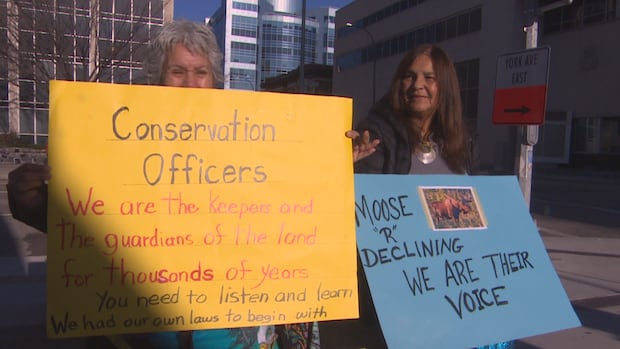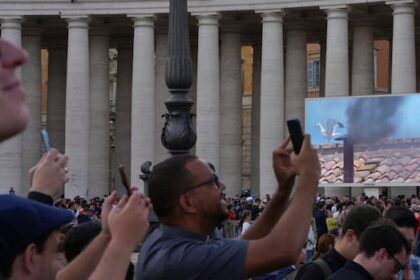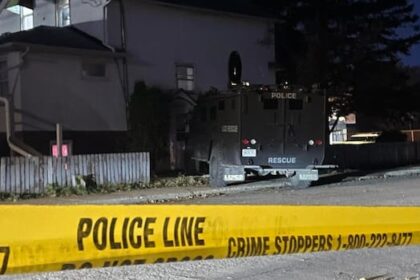ManitobaA packed Winnipeg courtroom heard arguments Thursday over whether a First Nation’s checkstop in southeastern Manitoba has illegally prevented licensed moose hunters from accessing public lands.Court is Manitoba Wildlife Federation’s ‘last hope’ to put an end to checkstop: lawyerOzten Shebahkeget · CBC News · Posted: Nov 13, 2025 8:52 PM EST | Last Updated: 38 minutes agoListen to this articleEstimated 5 minutesThe audio version of this article is generated by text-to-speech, a technology based on artificial intelligence. Supporters of Bloodvein First Nation are seen outside of a Winnipeg courthouse on Thursday. (Prabhjot Singh Lotey/CBC)A packed Winnipeg courtroom heard arguments Thursday over whether a First Nation’s checkstop in southeastern Manitoba has illegally prevented licensed moose hunters from accessing public lands.The Manitoba Wildlife Federation has asked Court of King’s Bench to stop Bloodvein First Nation from “blockading” Rice River Road before licensed moose hunting resumes in the region from Dec. 1 to 14, according to court documents filed last month.Bloodvein said in late August that it would start turning away licensed hunters from its Rice River Road checkstop, several kilometres south of the community, in order to address concerns about declining moose populations.The checkstop was originally set up on an access road just outside of the community in May to prevent drugs and alcohol from entering, court heard.Kevin Toyne, a lawyer representing the Manitoba Wildlife Federation — a conservation organization representing hunters in the province — argued more First Nations could erect similar blockades if the court doesn’t intervene.Failing to grant an injunction will be seen as “legitimizing this form of activity,” said Toyne.”How many Manitobans are entitled to blockade a public highway? Ultimately, the answer must be zero,” he told Justice Theodor Bock.”This can either be the only time a First Nation blockades a public highway … or it can be the first of many, and the public interest weighs exclusively for it to be the only instance.”The court is the Manitoba Wildlife Federation’s “last hope” to stop the blockade, after unsuccessful attempts to get the province, the federal government and law enforcement to intervene, said Toyne.”This is about ensuring that licensed hunters are able to make use of a public highway without being told that they have to turn around by someone who has no lawful authority to tell them that,” he said.”We’re not asking you to take [the checkstop] down, just to let the hunters through.”Injunction would be ‘incredibly detrimental’ In September, the province introduced a hunting buffer zone in specific gaming areas, affecting an area of 500 metres on either side of Rice River Road, and on either side of the Bloodvein River and Namay Falls.The buffer was inroduced on on Sept. 15 — the opening day of moose season for rifle hunters in the region — and will remain in place for the 2025 hunting season only. The Manitoba Wildlife Federation also asked the court last month for a judicial review of the buffer zone.Lawyers for both the province and Bloodvein argued that the issues of the buffer zone and the checkstop are unrelated and should not be heard together.The courtroom was filled with Bloodvein’s chief and council on Thursday, as well as community members and supporters, with more people standing outside the courthouse with signs of support for the First Nation.Dozens of people showed up to the courthouse in support of Bloodvein on Thursday. (Prabhjot Singh Lotey/CBC)Devon Mazur, a lawyer representing Bloodvein, asked Bock to dismiss the wildlife federation’s request for an injunction to stop the Rice River Road checkstop.”It’s important to recognize how incredibly detrimental granting this injunction would be to the Nation,” she said.”It would tell Bloodvein First Nation that its members, its fellow Nations, and Manitobans that recreational convenience is of greater importance than the profound and devastating community harm that Bloodvein suffers as a result of the flow of drugs and alcohol [into the community].”Mazur said discussions are continuing with the province, but Bloodvein Chief Lisa Young has said that her community hasn’t yet reached a decision on whether it will actually bar licensed hunters from crossing through the checkstop.As it stands, licensed moose hunters who approach the checkstop will not be turned away as long as they comply with the community’s alcohol and drug ban, Mazur said.She also claimed that the checkstop is not a blockade, because people can still fly by float plane into the affected hunting grounds.”In terms of being able to hunt and [access] those areas, we just point out that the road isn’t the only way to do that.”Jim Koch, a lawyer representing the Manitoba government, said the province is not taking a stance on whether the injunction that the Manitoba Wildlife Federation has requested should be granted.”In saying that, we do agree that access to Rice River Road should be available to all Manitobans, including licensed hunters,” Koch said in court.”However … the province’s preferred means to achieve that result has been, and continues to be, through dialogue with the First Nation,” which he said is key for the province to move toward reconciliation with First Nations.Issues brought forward by those communities “need to be addressed by the Crown,” said Koch.Bock reserved his decision, adjourning the proceedings until Nov. 27.ABOUT THE AUTHORÖzten Shebahkeget is a member of Northwest Angle 33 First Nation who grew up in Winnipeg’s North End. She has been writing for CBC Manitoba since 2022. She holds an undergraduate degree in English literature and a master’s in writing.Email: ozten.shebahkeget@cbc.ca
Thursday, 5 Mar 2026
Canada – The Illusion
Search
Have an existing account?
Sign In
© 2022 Foxiz News Network. Ruby Design Company. All Rights Reserved.
You May also Like
- More News:
- history
- Standing Bear Network
- John Gonzalez
- ᐊᔭᐦᑊ ayahp — It happened
- Creation
- Beneath the Water
- Olympic gold medal
- Jim Thorpe
- type O blood
- the bringer of life
- Raven
- Wás’agi
- NoiseCat
- 'Sugarcane'
- The rivers still sing
- ᑲᓂᐸᐏᐟ ᒪᐢᑿ
- ᐅᑳᐤ okâw — We remember
- ᐊᓂᓈᐯᐃᐧᐣ aninâpêwin — Truth
- This is what it means to be human.
- Nokoma











